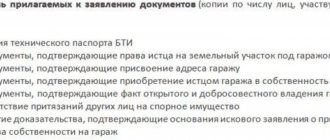Civil Code of the Russian Federation:
Article 234 of the Civil Code of the Russian Federation. Acquisitive prescription
1. A person - a citizen or a legal entity - who is not the owner of property, but who conscientiously, openly and continuously owns real estate as his own, unless other terms and conditions of acquisition are provided for by this article, for fifteen years or other property for five years , acquires ownership of this property (acquisitive prescription).
The right of ownership to real estate and other property subject to state registration arises in the person who acquired this property by virtue of acquisitive prescription from the moment of such registration.
2. Before the acquisition of ownership rights to property by virtue of acquisitive prescription, a person who owns the property as his own has the right to protect his possession against third parties who are not the owners of the property, as well as those who do not have the right to own it by virtue of anything else provided by law or contract grounds.
3. A person referring to the prescription of possession may add to the time of his possession the entire time during which this property was owned by the one whose legal successor this person is.
4. The period of acquisitive limitation in relation to things held by a person from whose possession they could be claimed in accordance with Articles 301 and 305 of this Code begins from the day the thing came into open possession of a bona fide acquirer, and if the right was registered property of a bona fide acquirer of an immovable thing that he owns openly - no later than the moment of state registration of the ownership rights of such acquirer.
Return to the table of contents of the document: Civil Code of the Russian Federation Part 1 in the current edition
What is acquisitive prescription?
The Civil Code of the Russian Federation does not establish a precise and complete definition of the concept of “acquisitive prescription”, however, Article 234 of the Civil Code of the Russian Federation reveals its main features.
- Firstly, this is the period established by law.
- Secondly, its implementation is possible only in court.
- Thirdly, throughout the entire period the person must own the property as his own.
- Fourth, ownership must be bona fide, open and continuous.
Thus, acquisitive prescription should be understood as the period established by the Civil Code of the Russian Federation, after which the person who owns the property can go to court to recognize the fact of acquisition of ownership, provided that he owned the disputed property continuously, openly and in good faith
Comments on Article 234 of the Civil Code of the Russian Federation, judicial practice of application
The grounds for acquiring property rights include acquisitive prescription (prescription of ownership).
Acquisitive prescription is the bona fide, open and continuous possession by a person who is not the owner for a certain period of time of any thing, giving the right to acquire this thing into ownership. The property for which it is possible to acquire ownership rights in connection with long-standing possession does not have a proper owner, or there is one, but does not show any interest in his property, does not enter into legally significant actions regarding the ownership, use and disposal of his property.
Ownership of property, taken into account as the basis for acquiring ownership rights by acquisitive prescription, must meet the following criteria :
1) ownership must not have a legal title , i.e. possession is illegal;
2) possession must be in good faith , i.e. the actual owner does not know and should not know about the illegality of possession, i.e. about the absence of a title. This could be, for example, a person who received an object under a gift agreement that was not properly executed; an heir who received a thing from a testator who did not have legal title.
In other words, bona fide possession is ownership that has arisen in a subject that is not the owner, without violations of the law, or with violations that the subject did not know about and should not have known about, in which the subject does not violate the rights, freedoms and legitimate interests of other persons and legal requirements. Judicial practice is based on the fact that the good faith of the owner of a long-term owner is determined, first of all, at the time of taking possession of the property, and at this moment the owner of a long-term owner has no reason to consider himself anyone other than the owner of the relevant property;
3) ownership must be open . Possession by prescription is considered open if the person does not hide the fact that the property is in his possession. Openness of ownership makes it possible for other persons to challenge this fact in the prescribed manner and serves as indirect evidence of the subject’s good faith.
In other words, open ownership is ownership, the nature and fact of which is known to a certain circle of persons and which can be known to an unlimited circle of persons only by virtue of the very fact of ownership;
4) possession must be continuous . Possession is considered continuous if it has not ceased during the entire period of acquisitive prescription.
The period of limitation for acquiring ownership of property depends on its type:
— real estate — 15 years;
- movable property - five years.
The requirement of continuity does not exclude the possibility for a person who refers to prescription of possession to add to the time of his possession all the time during which this property was owned by the one whose legal successor this person is.
For example, a person who owns property by virtue of acquisitive prescription may also be the legal successor of another person, for example, the heir of a deceased person who previously owned property by virtue of acquisitive prescription, or the legal successor of a reorganized legal entity. In this case, at the request of the person owning the property, the period of possession of this property by virtue of acquisitive prescription by the predecessor of this person may be added to the period of acquisitive prescription of possession due to the fact that the predecessor also owned this property in good faith, openly and continuously.
If the property was illegally removed from the possession of the owner by prescription and was reclaimed from someone else’s illegal possession, the temporary loss of possession of the disputed property is not considered a break in the prescription of possession. The transfer of property by a long-standing owner into temporary possession of another person does not interrupt the long-term possession;
5) ownership of property as one's own . That is, the owner of the property must bear the responsibilities of the owner of the property, namely: ensure its maintenance, carry out routine and major repairs (if necessary), maintain it in a condition consistent with its intended purpose.
Art. 234 of the Civil Code of the Russian Federation is not applicable in cases where ownership of property was carried out on the basis of contractual obligations (rent, storage, gratuitous use, etc.).
The right of ownership by virtue of acquisitive prescription can be acquired for property owned by another person, as well as for ownerless property. At the same time, the preliminary registration of ownerless real estate by the state registrar upon the application of the local government body in whose territory it is located (in the federal cities of Moscow and St. Petersburg - according to statements from the authorized bodies of these cities), and the subsequent refusal by the court to recognize the right of municipal property (or the property rights of the federal cities of Moscow and St. Petersburg) to this real estate are not a necessary condition for acquiring the right of private ownership to this object due to acquisitive prescription. The absence of state registration of ownership of real estate is also not an obstacle to the recognition of ownership of this property after the expiration of the acquisition limitation period.
A person who believes that he has become the owner of property due to acquisitive prescription has the right to apply to the court with a claim for recognition of his ownership rights. The defendant in a claim for recognition of ownership rights due to acquisitive prescription is the former owner of the property. In cases where the previous owner of real estate was not and should not have been known to the owner by prescription, he has the right to apply to the court to establish the fact of bona fide, open and continuous possession of the property as his own during the period of acquisitive prescription. The state registrar is involved as an interested party in the case.
In accordance with paragraph 2 of Art. 234 of the Civil Code of the Russian Federation, before the acquisition of ownership rights to property by virtue of acquisitive prescription, a person who owns the property as his own has the right to use proprietary methods to protect ownership against third parties who are not the owners of the property, as well as those who do not have the rights to own it as provided law or contract basis (clause 17 of the Resolution of the Plenum of the Supreme Court of the Russian Federation No. 10, Plenum of the Supreme Arbitration Court of the Russian Federation No. 22 of April 29, 2010 “On some issues arising in judicial practice when resolving disputes related to the protection of property rights and other property rights” ).
The acquisitive limitation period begins from the moment of taking possession of the property. However, based on clause 3 of Art. 234 of the Civil Code of the Russian Federation, a break in possession by prescription does not occur when the owner changes as a result of singular or universal succession. The new owner has the right to annex the time of ownership of the property by the predecessor.
From January 1, 2021, new rules for calculating the period of acquisition limitation will apply.
In paragraph 4 of Art. 234 of the Civil Code of the Russian Federation provides a special basis for the start of the period of acquisitive limitation, which is not limited by the conditions of paragraph 1 of Art. 234 Civil Code of the Russian Federation.
Based on the meaning of paragraph 4 of Art. 234 of the Civil Code of the Russian Federation, the beginning of the acquisition limitation period in the case where a thing can be reclaimed from someone else’s illegal possession begins from the moment when a bona fide purchaser began to openly own the thing. If the thing is immovable and the acquirer has registered the right to it, the period begins to run no later than the moment of state registration. Thus, this provision, which came into force on January 1, 2021, makes it possible to most effectively protect bona fide purchasers of real estate, for example, when a person relied on the Unified State Register data, he is considered bona fide. And the presumption applies until it is proven in court that he knew or should have known that the seller could not alienate the property.
Explanations of the Plenum of the Supreme Court of the Russian Federation
Clause 15 of the Resolution of the Plenum of the Supreme Court of the Russian Federation No. 10, the Plenum of the Supreme Arbitration Court of the Russian Federation No. 22 of April 29, 2010 “On some issues arising in judicial practice when resolving disputes related to the protection of property rights and other property rights” contains, in particular, the following explanations:
By virtue of paragraph 1 of Article 234 of the Civil Code of the Russian Federation, a person - a citizen or a legal entity - who is not the owner of property, but who conscientiously, openly and continuously owns either his own real estate for fifteen years or other property for five years, acquires the right of ownership to it property (acquisitive prescription).
When resolving disputes related to the emergence of property rights due to acquisitive prescription, courts must take into account the following:
possession by prescription is considered in good faith if the person, receiving possession, did not know and should not have known about the absence of a basis for the emergence of his ownership right;
possession by prescription is recognized as open if the person does not hide the fact that the property is in his possession. Taking ordinary measures to ensure the safety of property does not indicate the concealment of this property;
possession by prescription is recognized as continuous if it has not ceased during the entire period of acquisitive prescription. If the claim of a long-term owner for the recovery of property from someone else’s illegal possession is satisfied, the previous temporary loss of possession of the disputed property by him is not considered a break in long-term possession. The transfer of property by a long-term owner into temporary possession of another person does not interrupt the long-term possession. There is also no break in the prescription of possession if the new owner of the property is a singular or universal successor to the previous owner (clause 3 of Article 234 of the Civil Code of the Russian Federation);
Ownership of property as one's own means ownership other than by contract. For this reason, Article 234 of the Civil Code of the Russian Federation is not applicable in cases where ownership of property is carried out on the basis of contractual obligations (rent, storage, gratuitous use, etc.).
For more details, see paragraphs. 15-21 of the said Resolution
Explanations in the Review of Practice of the Supreme Court of the Russian Federation
Acquisitive prescription does not apply to unauthorized construction
Acquisitive prescription cannot extend to an unauthorized building located on an illegally occupied land plot. When considering disputes regarding the recognition of ownership of an unauthorized structure, it is necessary to take into account that the current legislation delineates the grounds for the emergence of ownership rights due to acquisitive prescription (Article 234 of the Civil Code of the Russian Federation) and in connection with unauthorized construction (Article 222 of the Civil Code of the Russian Federation). See in more detail “Review of judicial practice in cases related to unauthorized construction”; approved by the Presidium of the Supreme Court of the Russian Federation on March 19, 2014 (extract).





